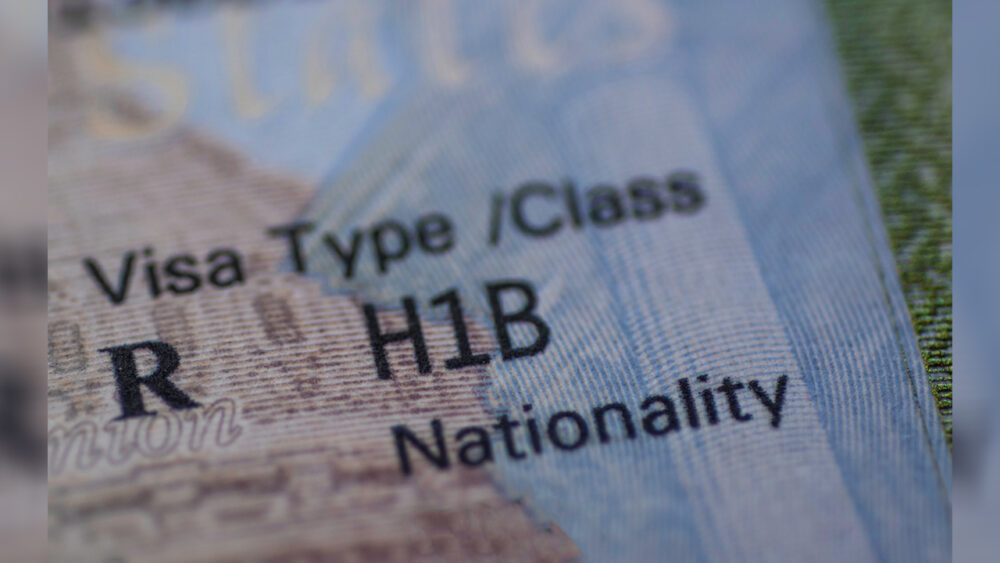A leading nationalist-populist author is urging Donald Trump to dramatically reduce on H-1B visas, warning that inaction could fracture the president’s rising working-class political coalition.
In a recent Substack post, Ryan James Girdusky, author of They’re Not Listening and publisher of the National Populist Newsletter, argues that the rapid replacement of entry-level white-collar jobs by artificial intelligence—combined with sustained legal immigration—poses a serious political risk for Trump.
“Want to turn tens of millions of Trump voters into Bernie or AOC voters before the next election?” Girdusky wrote, highlighting the dangers of policy neglect. “Automate their jobs out of existence, replace the few remaining with H-1B workers, and offer them no plan on how to move their lives forward.”
Girdusky’s warning comes as Trump’s job approval rating has surged to 52% among likely voters, according to a new Rasmussen poll.
The poll follows increased national media attention on illegal immigration and border security failures under the Biden administration, including violent protests in Los Angeles following new enforcement measures.
But polling also reflects growing bipartisan frustration with unchecked legal immigration, particularly its effect on the U.S. job market.
For years, Gallup pollsters have found that a plurality or majority of Americans want the total number of immigrants (legal and illegal) reduced.
The H-1B visa program, created in 1990 under President George H.W. Bush, was originally intended to address specific labor shortages in high-skilled fields—but critics say it has become a tool for large corporations to drive down wages.
While capped at 65,000 new visas annually—with another 20,000 for workers with advanced U.S. degrees—many major corporations, universities, and nonprofits are exempt. In FY 2026, over 120,000 H-1B approvals are expected, with tech giants leading the way.
The top H-1B sponsors—primarily major tech firms—Amazon (9,265 approvals), Infosys (8,140), Cognizant (6,321), Google (5,364), and Tata Consultancy (4,844), according to 2024 USCIS data.
Roughly 72% of H-1B visas go to workers from India, and 12% to those from China, the latest available USCIS data reveals. Spouses of H-1B workers can be granted their own work authorization through H-4 visas, further expanding the labor supply in affected job markets.
Critics argue the program artificially suppresses wages, particularly in some professional positions.
“[Federal law] requires that the hiring of a foreign worker will not adversely affect the wages and working conditions of U.S. workers comparably employed…. [DOL requires] that the wages offered to a foreign worker must be the prevailing wage rate for the occupational classification in the area of employment,” the New York Department of Labor says on its website.
Prior reporting by The Dallas Express revealed that at some firms in Texas, documents indicated that H-1B workers’ designated compensation was often placed near the bottom of the Department of Labor’s prevailing wage tool. While legal, this practice—combined with the reality that H-1B workers rarely organize or bargain for better pay due to their dependency on employer sponsorship— suggests that the visa holders could indeed be putting downward pressure on wages.
Girdusky highlights an alarming trend: unemployment among recent college graduates—especially in STEM fields that were once considered safe. According to Oxford Economics, recent grads now account for 12% of the post-2023 rise in national unemployment despite being just 5% of the workforce.
Data from the New York Federal Reserve shows computer science grads now face a 6.1% unemployment rate, while physics majors face 7.8%. Barron’s reports the underemployment rate has ballooned to 41.2%.
“It’s the worst job market for recent college graduates since the peak of the COVID pandemic and before that, since the Great Recession,” writes, adding that the government’s refusal to address legal immigration loopholes and the AI boom is accelerating economic dislocation. He blames, in part, a structural shift accelerated by AI and lax immigration enforcement.
Girdusky quotes an article from The Atlantic that read, “As law firms leaned on AI for more paralegal work, and consulting firms realized that five 22-year-olds with ChatGPT could do the work of 20 recent grads, and tech firms turned over their software programming to a handful of superstars working with AI co-pilots, the entry level of America’s white-collar economy would contract”
Executives seem to agree. Anthropic CEO Dario Amodei told CNN that technology could eliminate half of all entry-level, white-collar jobs within the next five years. A LinkedIn post from Retool recently said that the company’s leaders want “to automate 10% of US labor by 2030.”
Meanwhile, corporate lobbying efforts—often backed by Silicon Valley and Wall Street—have continued to push for expanding the H-1B program, despite domestic supply of qualified graduates. While a Biden-era rule was aimed at reducing fraudulent filings, industry demand remains high.
The number of bachelor’s degree earners in computer and information sciences rose 4.3% in 2024, according to the National Student Clearing House, even as overall degree completion declined—highlighting the mismatch between domestic labor supply and hiring practices.
The disconnect is raising alarm even among Republicans and it has prompted defenses of the visa program. Former presidential candidate and Ohio gubernatorial hopeful Vivek Ramaswamy tweeted in December that the issue isn’t a lack of talent among Americans, but a culture that “venerated mediocrity over excellence.” He argued that unless American youth are taught to prize academic rigor and discipline over conformity and entertainment, “we’ll have our asses handed to us by China.”
Girdusky’s central warning is stark: ignore the labor disruptions caused by AI and mass legal immigration, and Republicans risk alienating their own voter base. He warns that disaffected voters could defect to the Left if conservative leaders fail to defend American workers.
“Republicans could be playing a perilous game,” he concluded.


